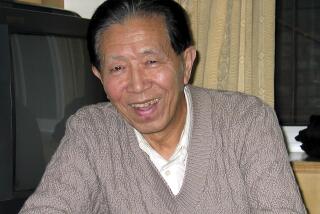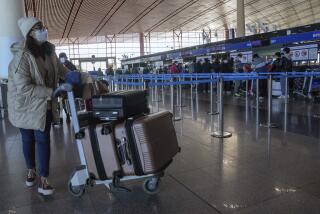Gains Cited in SARS Battle
- Share via
SINGAPORE — The World Health Organization said Monday that SARS appeared to have peaked in some of the areas hit hardest by the disease, but the virus is still spreading in China and to new locations.
David Heymann, WHO’s chief of communicable diseases, said the outbreak’s worst days appeared to be over in Canada, Singapore and Hong Kong, where more than half of the known deaths from the virus occurred in the last six weeks.
However, the pneumonia-like illness is continuing to infect more patients in China despite stepped-up efforts by the government to halt its spread.
China reported 203 new cases Monday and eight fatalities, which brought the country’s death toll to 139. Worldwide, the virus has infected about 5,000 people and killed more than 330.
“It seems that it has peaked in all places that we knew about on the 15th of March, except in China, and in China it’s on the increase, unfortunately,” Heymann said in Bangkok, Thailand, where Asian leaders will be meeting today to discuss the crisis.
In other setbacks, Mongolia today confirmed its first two cases of the disease, and Indonesia on Monday reported its first probable SARS death, a 56-year-old Taiwanese businessman who arrived in the country nearly two weeks ago and died Saturday in the capital, Jakarta.
Indonesian health authorities said the businessman was only the third probable SARS case officials had discovered. But some officials expressed concern that the disease might have entered the country undetected and could rapidly gain a foothold.
Crowded Indonesia has the world’s fourth-largest population and an inadequate, poorly funded health-care system.
“If we imagine SARS entering Indonesia, it is frightening,” Health Ministry spokeswoman Mariani Reksoprodjo said.
With the businessman’s death, Indonesia became the sixth country in Southeast Asia to report a probable fatality from the disease. SARS deaths have been reported in Singapore, Thailand, Malaysia, the Philippines and Vietnam.
Vietnam became the first country in the world to contain the disease when it went 20 days -- twice the incubation period -- without a new reported case, WHO announced Monday.
Singapore, which has been among the most aggressive governments in combating the disease, was not prepared to agree with Heymann’s conclusion that the disease had peaked here.
Health Minister Lim Hng Kiang said Singapore had not had a new case for two days and that only 39 patients remained hospitalized, but the city-state would have to wait to see whether any new cases developed.
“I would never make such a prediction,” Lim said. “We always have to be vigilant. I think we can make such an assessment after we have gone through two incubation periods and there are no new cases.”
One Singapore SARS patient died Monday, bringing the country’s fatalities to 22, with autopsy results pending for a 23rd death.
Among the other countries causing concern among health officials is India, which reported two more cases of the illness Monday, bringing its total to nine. India has yet to demonstrate it is serious about combating the virus, and some fear SARS could spread there as rapidly as it has in China.
The disease originated in southern China late last year, but government inaction allowed the virus to multiply for months before it jumped to other countries.
Now, health officials said, eradicating the disease in China is essential to preventing the reinfection of areas where SARS has been contained.
“China is the key, and it’s the unknown question in the whole formula, because if China cannot contain it, then it can’t be removed,” Heymann said.
On Monday, more than a week after Beijing authorities admitted grossly underreporting SARS cases, WHO experts remained frustrated by the paucity of data China was releasing. While Beijing is providing daily totals of the country’s number of cases, the statistics lack details about when, how or where the patients became infected.
WHO China representative Henk Bekedam said his team told Beijing authorities: “You’re coming up now with data, but nobody’s understanding the data. Nobody’s understanding what’s going on in Beijing.”
Many residents of the capital are fleeing because of SARS. China’s Transportation Ministry said some local officials were blocking roads and turning away vehicles from SARS-hit areas.
In the first incidence of social unrest related to SARS in China, rural residents near the nation’s fourth-largest city Sunday smashed and burned a school they believed officials were converting into a ward for SARS patients.
Inhabitants of Chagugang, a township near the city of Tianjin, were furious to find carpenters building individual rooms within the school. They burned sickbeds and tore apart the new construction before police detained an unknown number of the protesters, residents said.
A statement from the Tianjin municipal foreign affairs office said the school had been abandoned for almost a year. The government intended to use it as an “observation facility” for those who had been in contact with SARS patients but canceled the project about 4 p.m. Sunday in the face of residents’ opposition.
“Around 6 p.m., at the instigation of a few people, some tens of villagers who did not understand the true situation smashed the windows of the school building and the township government,” the statement said.
One angry resident, who was interviewed by phone but did not want her name used, said, “We haven’t got any SARS cases here, and we would definitely not allow them to build a SARS ward. Everyone opposes it.”
Despite such panic, some scientists said Monday the threat from SARS has been overblown.
“I think there has been overreaction” to SARS, said David Baltimore, a leading AIDS researcher who won the 1975 Nobel Prize in medicine for his work on how viruses cause disease. In contrast to AIDS, which kills virtually everyone it infects who does not receive treatment, 94% of SARS patients recover.
*
Researcher Guo Hui and special correspondents Anthony Kuhn in Beijing, Sari Sudarsono in Jakarta and Ting-I Tsai in Taipei, Taiwan, contributed to this report, as did Times wire services.
More to Read
Sign up for Essential California
The most important California stories and recommendations in your inbox every morning.
You may occasionally receive promotional content from the Los Angeles Times.










